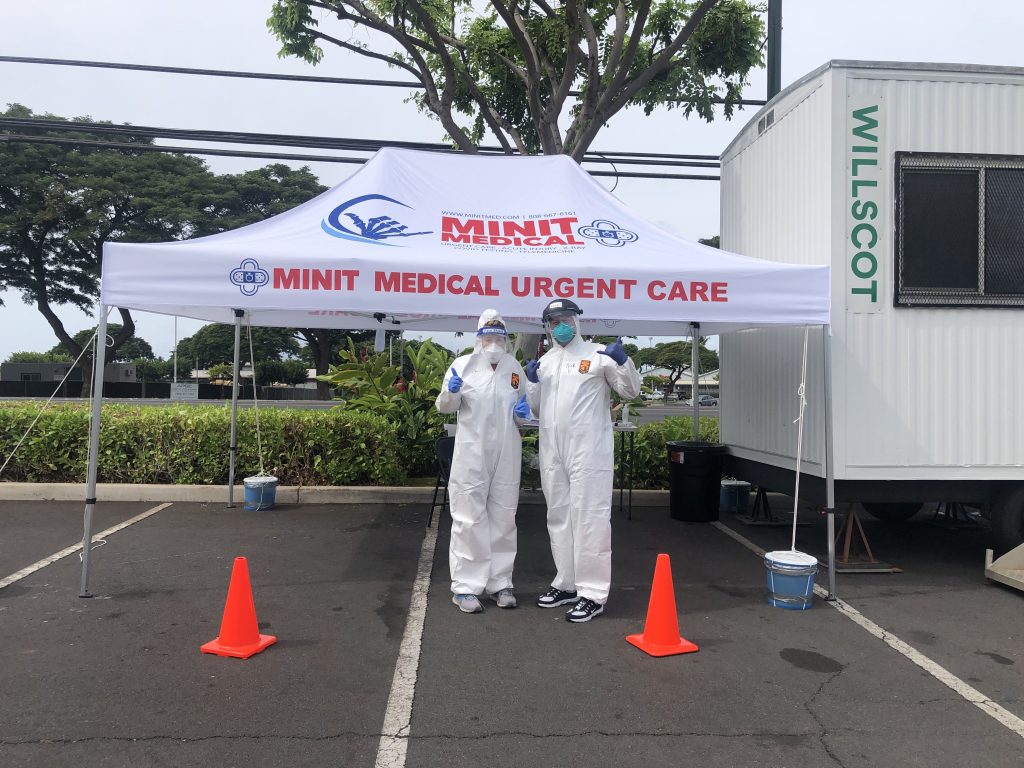10 Positives Out of 11,027 Post-Arrival COVID-19 Tests in Hawai‘i

Minit Medical is administering Maui Countyʻs free COVID-19 testing program. Photo Credit: County of Maui
Since the launch of the Safe Travels Hawaiʻi pre-travel testing program on Oct. 15, the first round of post-travel testing indicates very few travelers have tested positive for COVID-19 after arrival to Hawaiʻi, the state Department of Health reports.
From Oct. 19 to Nov. 2, there have been 10 confirmed positives out of 11,027 tests conducted for a positivity rate of .091%.
A separate post-arrival test established on Maui has documented three positive cases out of more than 1,200 individuals who have opted for participation in the program between Oct. 17 and 31. On Maui, travelers must have taken a pre-departure test to be eligible for the free post-arrival test, and are invited to take the second test 72 hours or later after they arrive in Maui County. Travelers participating in the Maui program must pre-register by visiting www.minitmed.com/travelers-voluntary. (If you have any problem pre-registering, please call (808) 667-6161, ext. 7, for help and more information).
The Safe Travels Testing Evaluation Program, or strategic surveillance study, collects and evaluates data from COVID-19 testing of travelers post-arrival to Hawaiʻi. The program is intended to gauge the frequency of COVID-19 among returning residents and visitors and determine the effectiveness of the Safe Travels Hawaiʻi pre-travel testing program.
“This surveillance study is one more layer of safety to complement the overall Safe Travels Hawaiʻi pre-travel testing program,” Lt. Gov. Josh Green said. “We are at a critical point in the COVID-19 pandemic when we need to balance public health and safety with the economic well-being of our Islands, which as we know is also very much tied to the health of Hawaiʻi’s people. We anticipate this study will serve as a guide for state leadership and policy makers on how to move Hawaiʻi forward.”
To participate in the study, individuals must have also participated in the Safe Travels Hawaiʻi pre-travel testing program, which requires travelers to receive a negative nucleic acid amplification test (NAAT) from a trusted testing partner 72 hours prior to departure to Hawaiʻi in order to avoid the State of Hawaiʻi’s mandatory 14-day quarantine. Individuals are chosen via representative systematic selection to participate in the program by getting a second test one to four days after their arrival to Hawaiʻi. The second test is voluntary and free of charge to participants.
The State of Hawaiʻi has partnered with pharmacies, healthcare facilities and hotel properties to conduct testing on Oʻahu, Kauaʻi and Hawaiʻi Island. The following are testing and sharing data for the study: Premier Medical Group, Hawaiʻi Pacific Health, The Queen’s Health Systems, Doctors of Waikiki, Kaiser Permanente, Adventist Health Castle, The Resort Group and select Walgreens locations. Additionally, the study is evaluating post-arrival testing data from counties.
Dr. DeWolfe Miller, epidemiologist from the University of Hawaiʻi’s John A. Burns School of Medicine, is leading the study in coordination with Hawaiʻi Emergency Management Agency (HI-EMA), Governor’s Office, Lt. Gov. Josh Green and testing partners.
“The results of this study will demonstrate if screening for symptoms and an NAAT test for COVID-19 is negative prior to travel to Hawaiʻi will be sufficient to keep Hawaiʻi safe from additional introduction of COVID-19 infection,” Dr. Miller said. “To do that the project is screening (re-testing) a sample of arrivals.”
The State of Hawaiʻi will fund up to $1.5 million for the program via CARES Act funding, as the program provides a critical layer of security for the overall Safe Travels Hawaiʻi pre-travel testing program. The program began on Oct. 18 and will run through Dec. 31, 2020. Regular updates will be given to policy makers and data updates will be available once-weekly to media and the public. The Safe Travels Hawaii pre-travel testing program may be adjusted based on the program’s findings in the coming weeks. An overall report will be finalized once the study concludes.










